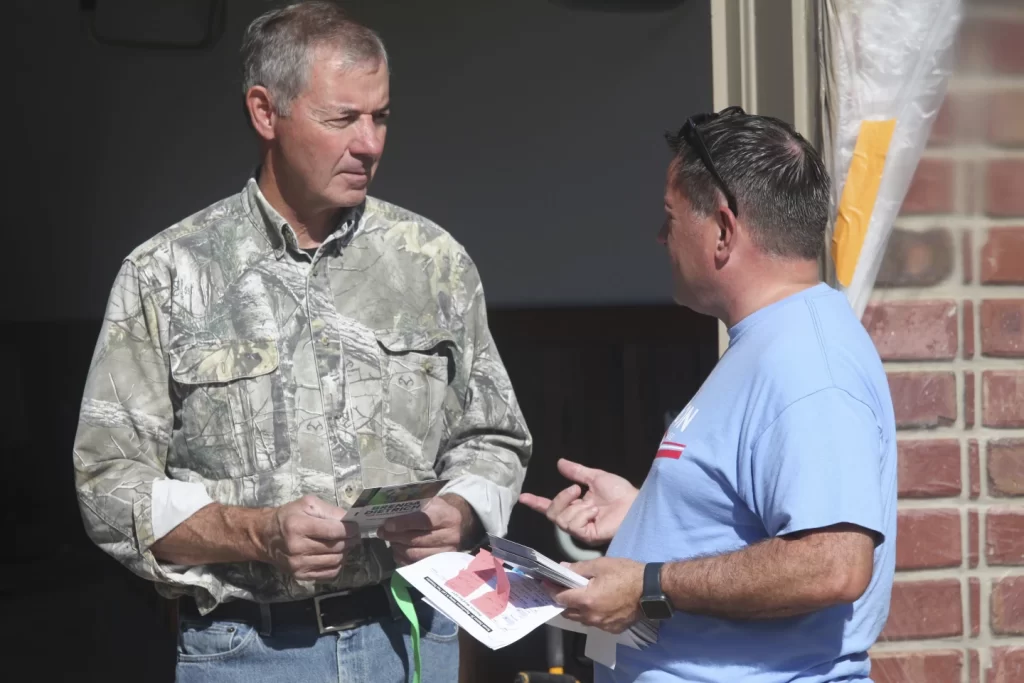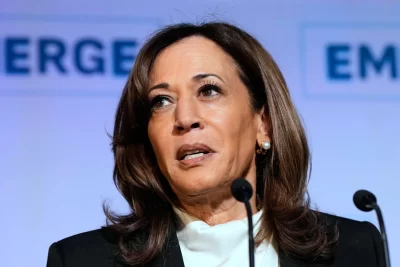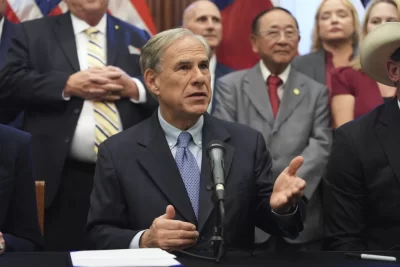
SHAWNEE, Kan — After introducing herself at their front doors, Vanessa Vaughn West began her pitch to voters with a question: What issues are important to you? She heard frustration about rising local property taxes, a desire for smaller government and questions about affordable housing.
West is a Democrat making her second run for a Kansas House seat representing a western Kansas City neighborhood where Republicans have held sway since the construction of homes began in the late 1990s.
Despite that history, West’s race against Republican state Rep. Angela Stiens is on the national Democratic Party’s radar, as is the Kansas Legislature. Democrats need to gain just two seats in the 125-member House or three in the 40-member Senate to break a supermajority that has enabled Republicans to override Democratic Gov. Laura Kelly’s vetoes of measures restricting abortion providers and transgender rights.
A similar battle is playing out in North Carolina, where the flip of a single seat in either the House or Senate could cost Republicans a veto-proof majority that has repeatedly imposed its will over the objections of a Democratic governor. In Nevada, meanwhile, it’s Democrats who stand to gain a veto-proof majority over a Republican governor, if they can pick up just one more state Senate seat without losing one in the Assembly.
Nationwide, more than 5,800 state legislative seats in 44 states are up election this year in the background of higher profile contests for president, Congress and governor. Groups aligned with Democrats and Republicans are expected to pour a couple hundred million dollars into the state legislative battles, focusing most intensely on states where control of a chamber is in play: Arizona, Michigan, Minnesota, New Hampshire, Pennsylvania and Wisconsin.
But they also are paying attention to some states where there is little doubt about which party will prevail, because there is still plenty at stake.
The Associated Press identified 14 states where a swing of just three or fewer seats could determine whether a party holds a supermajority, meaning a margin so dominant that a party is able to enact laws despite a governor’s veto, convene special sessions or place constitutional amendments on the ballot without needing any support from lawmakers of an opposing party.
GOP districts in Kansas draw Democrats’ attention
In Kansas, Stiens was appointed to fill a House vacancy this spring in time to help override Kelly’s veto of a bill requiring abortion providers to ask patients why they want to end their pregnancies and submit that data to the state health department. The law isn’t being enforced amid legal challenges.
But West said the Legislature’s continued push for restrictions on abortion providers is one reason she is running against Stiens, just two years after narrowly losing to Stiens’ predecessor. West strongly supports abortion rights and residents in her home of Johnson County voted by nearly 69% in favor of abortion rights during a decisive 2022 statewide vote.
“This is why we need parity, right?” West said as she walked from home to home talking to prospective voters. “And this is why we need support for what I would call the voice of the people — making sure that when the people vote on things like that, that we as legislators reinforce those sentiments with our votes.”
Though still leaning Republican and largely white, the Kansas City suburbs have become more racially diverse and friendlier to Democrats since former President Donald Trump’s victory in 2016. But national Democrats also are targeting a portion of southwestern Topeka, a longtime Republican area where GOP state Rep. Jesse Borjon is seeking a third term against Democrat Jacquie Lightcap, a local school board member.
Campaigning door-to-door recently in a neighborhood of late-1980s homes with three-car garages, Borjon emphasized his support for public schools and tax cuts enacted this year. His vote for eliminating the state income tax on Social Security benefits resonated with Bob Schmidt, a retired computer company executive who chatted with Borjon about rising property taxes.






